
What's Going On is the eleventh studio album by American soul singer Marvin Gaye. It was released on May 21, 1971, by the Motown Records subsidiary label Tamla. Recorded between 1970 and 1971 in sessions at Hitsville U.S.A., Golden World, United Sound Studios in Detroit, and at The Sound Factory in West Hollywood, California, it was Gaye's first album to credit him as producer and to credit Motown's in-house session musicians, known as the Funk Brothers.

"I Heard It Through the Grapevine" is a song written by Norman Whitfield and Barrett Strong for Motown Records in 1966. The first recording of the song to be released was produced by Whitfield for Gladys Knight & the Pips and released as a single in September 1967. It went to number one on the Billboard R&B Singles chart and number two on the Billboard Pop Singles chart and shortly became the biggest selling Motown single up to that time.

For Real is an American R&B and soul quartet, that formed in 1990. In the latter part of that decade they were nominated for a Billboard Music Award and a Soul Train Music Award. The ladies have now reunited and are touring.
Hip hop soul is a subgenre of contemporary R&B music, most popular during the early and mid 1990s, which fuses R&B or soul singing with hip hop musical production. The subgenre had evolved from a previous R&B subgenre, new jack swing, which had incorporated hip-hop influences into R&B music. By contrast, hip hop soul is, as described in The Encyclopedia of African American Music, "quite literally soul singing over hip hop grooves".
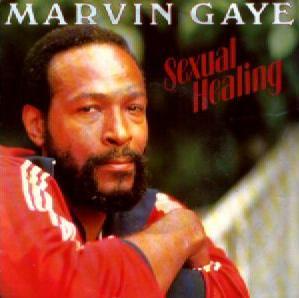
"Sexual Healing" is a song recorded by American singer Marvin Gaye from his seventeenth and final studio album, Midnight Love (1982). It was his first single since his exit from his long-term record label Motown earlier in the year, following the release of the In Our Lifetime (1981) album the previous year. It peaked at No. 3 on the Billboard Hot 100 and is listed at number 198 on Rolling Stone's list of 500 Greatest Songs of All Time. "Sexual Healing" is written and composed in the key of E-flat major and is set in time signature of 4/4 with a tempo of 94 beats per minute.

"Got to Give It Up" is a song by American music artist Marvin Gaye. Written by the singer and produced by Art Stewart as a response to a request from Gaye's record label that he perform disco music, it was released in March 1977.
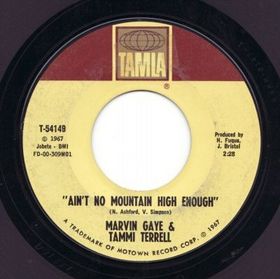
"Ain't No Mountain High Enough" is a song written by Nickolas Ashford & Valerie Simpson in 1966 for the Tamla label, a division of Motown. The composition was first successful as a 1967 hit single recorded by Marvin Gaye and Tammi Terrell, and became a hit again in 1970 when recorded by former Supremes frontwoman Diana Ross. The song became Ross's first solo number-one hit on the Billboard Hot 100 chart and was nominated for the Grammy Award for Best Female Pop Vocal Performance.
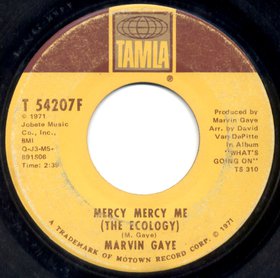
"Mercy Mercy Me (The Ecology)" is the second single from American singer-songwriter Marvin Gaye's 1971 album, What's Going On. Following the breakthrough of the title track's success, the song, written solely by Gaye, became regarded as one of popular music's most poignant anthems of sorrow regarding the environment. Led by Gaye playing piano, strings conducted by Paul Riser and David Van De Pitte, multi-tracking vocals from Gaye and the Andantes, multiple background instruments provided by the Funk Brothers and a leading sax solo by Wild Bill Moore, the song rose to number 4 on Billboard's Pop Singles chart and number one for two weeks on the R&B Singles charts on August 14 through to August 27, 1971. The distinctive percussive sound heard on the track was a wood block struck by a rubber mallet, drenched in studio reverb. The song also brought Gaye one of his rare appearances on the Adult Contemporary chart, where it peaked at number 34. In Canada, "Mercy Mercy Me" spent two weeks at number 9.

"I Want You" is a song written by Leon Ware and Arthur "T-Boy" Ross and performed by American singer and songwriter Marvin Gaye. It was released as a single in 1976 on his fourteenth studio album of the same name (1976) on his Tamla label. The song introduced a change in musical styles for Gaye, who before then had been recording songs with a funk edge. "I Want You", among other similar songs, gave him a disco audience. Ware, who produced the song alongside Gaye, also was attributed with the single's success.
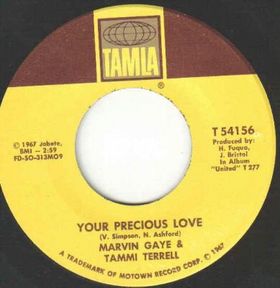
"Your Precious Love" is a popular song that was a 1967 hit for Motown singers Marvin Gaye and Tammi Terrell. The song was written by Nickolas Ashford and Valerie Simpson, and produced by Harvey Fuqua and Johnny Bristol. The doo-wop styled recording features background vocals by Fuqua, Gaye, Terrell and Bristol, and instrumentals by The Funk Brothers with the Detroit Symphony Orchestra. The song peaked at #5 on Billboard Pop Singles chart, #2 on Billboard's R&B Singles chart, and the top 40 on Billboard's Easy Listening survey. The song was later sampled by Gerald Levert on the song, "Your Smile", on his 2002 album, The G Spot.
"It Takes Two" is a hit single recorded in late 1965 by American singer-songwriter Marvin Gaye and American soul singer Kim Weston for Motown's Tamla label.
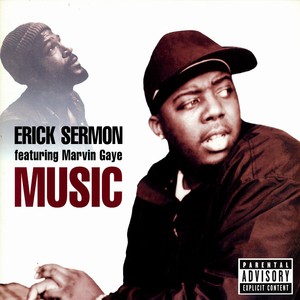
"Music" is a 2001 hit single by Erick Sermon featuring archived vocals from Marvin Gaye.

Midnight Love is the seventeenth studio album by Marvin Gaye and the final album to be released during his lifetime. He signed with the label Columbia in March 1982 following his exit from Motown.
Contemporary R&B is a popular music genre that combines rhythm and blues with elements of pop, soul, funk, hip hop, and electronic music.
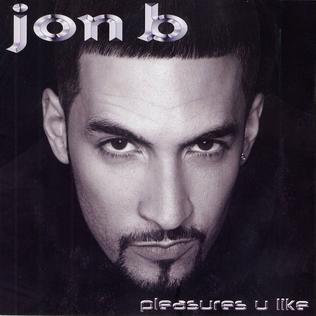
Pleasures U Like is the third studio album by American singer Jon B. Released on March 20, 2001 in the United States, it marked his first album under Tracey Edmonds' label Edmonds Record Group which was formed after Jon's previous label home Yab Yum Records had folded. On Pleasures U Like, Jon reunites with past producers Babyface and Tim Kelley and Bob Robinson, who each produced one song. Also present on the album is the team of musician Joshua P. Thompson and Quincy Patrick.

University is the sixth studio album by the American alternative rock band Throwing Muses, released in 1995. It contains the single "Bright Yellow Gun", the band's first national hit.

"Boombastic" or "Mr. Boombastic" is a song by Jamaican musical artist Shaggy, released in May 1995 by Virgin Records as the second single from his third studio album, Boombastic (1995). The song was both produced and co-written by Shaggy. After being used in an ad for Levi's, it achieved commercial success in many countries, including Ireland, UK, Sweden, New Zealand, and Australia, where it topped the singles charts. It spent a week at number one on both the US Billboard R&B chart and the UK Singles Chart. It also reached number three on the Billboard Hot 100. The track contains a sample from King Floyd song "Baby Let Me Kiss You". A remix featuring Sting International, which features a sample of Marvin Gaye's "Let's Get It On", was released in January 1996. The latter is featured on some versions of the Boombastic album as a bonus track.

The Love & War MasterPeace is the third studio album by American singer Raheem DeVaughn. It was released by Jive Records on March 2, 2010. The album was also released as a deluxe edition with an additional disc of bonus material. Recording sessions for the album took place during 2008 to 2009 and production was handled primarily by Kenny "Dope" Gonzalez.

Hot Coko is the debut solo studio album by American R&B singer Coko. It was released by RCA Records on August 10, 1999.Hot Coko served as the singer's debut effort following the release of her band SWV's third album Release Some Tension (1997), which led towards the group's first disbandment in 1998. Guest appearances on the album are made by rapper Eve and singer Tyrese. Hot Coko features production from the likes of Damon Thomas, Rodney Jerkins, Marc Anthony, Missy Elliott, Timbaland and Brian Alexander Morgan, whom Coko worked with while a member of SWV earlier in the decade.

Green Suede Shoes is an album by the American band Black 47, released in 1996. It was a commercial disappointment.















